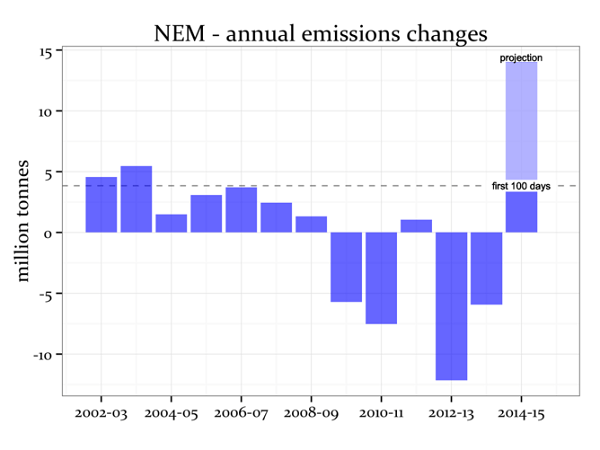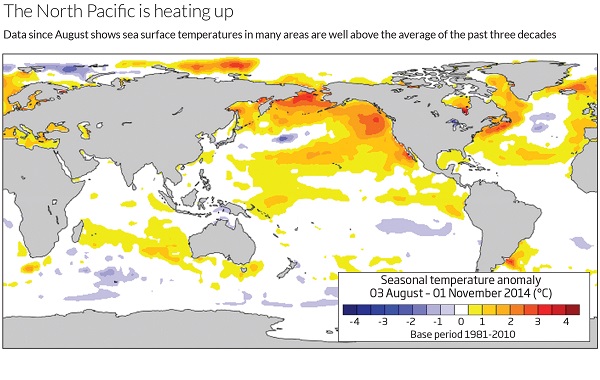1. Australia’s coal and gas exports are being left stranded
Just four countries account for 80% of Australia’s fossil fuel exports – China, Japan, Korea and India.
China is on the verge of “peak coal”, rebalancing the economy away from energy intensive industry and introducing a national emissions trading scheme.
Japan is on an energy efficiency drive to reduce its fuel import bill.
Korea has introduced a tax on coal of AU$18 per tonne and is finalising an emissions trading scheme.
India has doubled its tax on coal which funds renewable energy projects and has signalled its intention to stop importing coal within 2-3 years.
Official forecasts are in denial.
2. Are Australian and US climate targets the same?
Environment minister Greg Hunt, Radio National, November 17:
If you use the full Kyoto period — 1990 to 2020 — the US is minus 5% and Australia is almost exactly the same.
Joe Hockey made a similar statement that “If you compare apples with apples, the American position and our position on reductions are effectively the same.”
The comparisons are complex, because the starting and finishing dates are different, so are the population increases. Moreover Australia has forestry and tree clearing in the mix.
Malte Meinshausen and Anita Talberg make the necessary adjustments and find:
An apples-with-apples comparison shows that Australia lags far behind the United States in efforts to reduce greenhouse gas emissions from its energy, transport and industrial sectors.
To match US efforts, Australia would have to increase its 2020 ambitions from the current 5% below 2000 to 21% or even 29%, depending on whether different population growth is taken into account, or not.
In short, they lie!
3. The genius of Tony Abbott’s stance on climate

At New Matilda Tom Allen comments on Tom Switzer’s claim the Abbott is a climate change genius. Switzer is a climate change denialist, so we won’t bother with that! Allen finds Abbott has proved one thing – that a carbon tax works!
Abbott
will be remembered as the Prime Minister who proved that the carbon tax worked. After it was introduced, Australia’s carbon dioxide emissions fell, the economy continued to grow and the sky remained in place.
When Abbott repealed it and the country’s emissions began to rise again, using Australia as a vast laboratory, Abbott confirmed it: carbon taxes work.
4. Record growth in electricity sector emissions
Abbott’s genius is demonstrated by this graph of emissions change from electricity production:

The reductions started well before the carbon ‘tax’, but whatever the reason Abbott seems to have made a difference.
WORST. PRIME MINISTER. EVER!!
As Tom Allen said, it’s nothing personal.
The worst things about him are his policies, and his stance on climate change is worst of all.
5. Record-breaking ocean temperatures
The world’s oceans are the hottest they’ve ever been in the modern record, especially in the northern Pacific.
In July this year, ocean surfaces were 0.55 °C above the average since 1890, just beating the previous record of 0.51 °C in 1998. In the North Pacific, the temperatures were about 0.8 °C above average, which is 0.25 °C warmer than the 1998 peak.

No explanation is given as to why this pattern has emerged. However, it does seem to be disrupting the development of an El Niño. Small mercy, because the northern Pacific warming has effects similar to an El Niño:
This includes more hurricanes in the Pacific, as well as more storms curling over into mainland US. Meanwhile, there have been fewer hurricanes in the Atlantic, just as happens during El Niño. Elsewhere, dry conditions have occurred across Australia, and the Indian monsoon was delayed – effects all arising from warm oceans, despite the lack of an El Nino event.
6. Turn down the heat : confronting the new climate normal
This is volume 2 of 2 of a report prepared for the World Bank by the Potsdam Institute for Climate Impact Research and Climate Analytics, and hence highly authoritative. The lead author was Hans Joachim Schellnhuber of the Potsdam Institute.
It’s a massive 320 page report. This is from the Foreword:
There is growing evidence that warming close to 1.5°C above pre-industrial levels is locked-in to the Earth’s atmospheric system due to past and predicted emissions of greenhouse gases, and climate change impacts such as extreme heat events may now be unavoidable.
As the planet warms, climatic conditions, heat and other weather extremes which occur once in hundreds of years, if ever, and considered highly unusual or unprecedented today would become the “new climate normal” as we approach 4°C—a frightening world of increased risks and global instability.
The consequences for development would be severe as crop yields decline, water resources change, diseases move into new ranges, and sea levels rise. Ending poverty, increasing global prosperity and reducing global inequality, already difficult, will be much harder with 2°C warming, but at 4°C there is serious doubt whether these goals can be achieved at all.
That’s about as far as I could get tonight. Climate Progress has a post.

